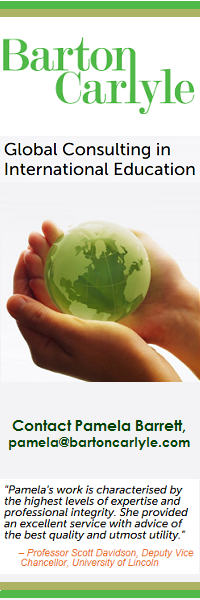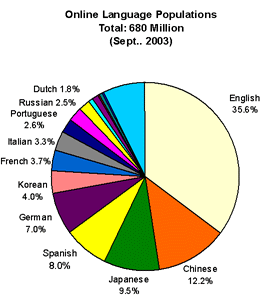International Educators
- About USjournal.com, LLC
- Advertising / Promotional Options
- Advertising Rate Card (pdf)
- Academic Program Listing (pdf)

- Current USjournal.com Advertisers
- Current USjournal.com Services
- Follow USjournal on LinkedIn
- FundsV Named Innovation Finalist
- Growth in Online Language Usage
- Multi-lingual Campaign Advantages
- SkyRadio Audio Segment (wma)
- Strategic Partnership with USDOC

- USjournal.communique
- USjournal History
- USjournal Innovation Lab
| usjournal.communiqué -
e-Recruitment Trends and Techniques, November 2003 It's messier than you think. |
(These comments will also serve as the basis for Cheryl Darrup-Boychuck's portion of two NAFSA Regional Conference Sessions: Region XIII in Virginia, and Region X in New York.)
- Global Online Language Populations, as of September 2003
- Other Best Business Ideas from Harvard Business Review
Every year, editors of the Harvard Business Review (HBR) compile their own very opinionated take on what business executives should be thinking about as they look into the future. This year's list of the best business ideas is about moving on; they are ideas that the HBR editors hope will stimulate readers to think in new ways, even if they're thinking about old problems: Stop putting out old fires, and get out and light some new ones.
My favorite from The List (published in April 2003): It's messier than you think.
As international educators, we're way ahead of you, HBR.
Here's what HBR says: The fact is, organizations are not, in essence, rational... And they're getting messier. By its nature, work in a mass-production economy imposes order and conformity. But work in today's knowledge economy seeks variety and innovation. If the orderly assembly line was the symbol of mass production, the messy desk in the icon of the information age...
It's a wonder any work gets done at all. But messiness isn't all that bad. Much like a Jackson Pollock painting, it can be confusing and disorderly -- defying conventional aesthetics -- but at the same time pulsing and vibrant... Anybody who's ever actually worked for a living knows that informal channels are where the real work is done.
And therein lies the greatest asset of usjournal.com: Our relationships.
Sure, we utilize sophisticated technology to efficiently filter prospective international student inquiries through our unique search mechanism, and we relay those qualified inquiries to our sponsors via instantaneously-forwarded e-mail messages and via automatically-generated Excel Reports on a weekly, monthly or quarterly basis. In all likelihood, that successful model of initial inquiry generation will continue to serve as the foundation of our organization.
But there's so much more to usjournal.com.
This month, for example, we're coordinating campus visitations at four of our sponsoring universities, for a Chilean colleague who intends to send a group of his students to the U.S. for a four- to six-week intensive English language program in January / February 2004.
Yes, it's all about relationships. And granted, those relationships are inherently messy... and it's leading us further into a gray area, where the results of our efforts are not so easily tracked in tidy Excel Reports.
When we went online in April 1996, we anticipated a simple black-and-white scenario for measuring Return on Investment: At the end of each enrollment cycle, our advertisers would simply cross-reference their enrollee list with the names on their customized usjournal.com Excel Reports. If only life were so simple... and in some cases, life is that simple: The same names pop up on both lists. Many of our sponsors and students have told us about their success stories. We've learned that reality, though, is messier than simple cross-referencing in many cases. Prospective students (and parents) need to hear about your campus from a variety of sources, including the internet, friends and relatives, agents, fairs and so on. And that's why we're collaborating with those entities to best serve our advertisers.
(Stay tuned for more details about those evolving relationships...)
In the meantime, here's a specific example of the inherent messiness of online international student recruitment, gleaned from hundreds of conversations with prospective international students who visit us every month.
Because of our targeted promotional campaigns, most students use some version of our simple selection page to register their degree preferences, academic preferences, funding capability, and U.S. geographic preferences. Results appear according to criteria our sponsors specify.
From there, it gets messy. Many students click through to our inquiry form, where the student voluntarily types their demographic information such as name, e-address, mailing address, expected start date, citizenship and so forth. Other increasingly tech-savvy students, however, try to go directly to the university's website. When the student leaves our site, we lose the opportunity to capture their demographic data. Consequently, that student's name would not show up on the campus' Excel Report from us, even though usjournal.com was in fact his / her initial point of contact.
Early in the history of usjournal.com, we resisted that reality: We limited the number of external links leading outside of our domain, and we added more links to our inquiry pages. In the past few months, however, we consciously stopped fighting that inertia caused by the ever-increasing tech-savviness of the globally-minded students that use our site.
Yes, we will continue to encourage students to complete our online inquiry forms so we can collect their data, and forward them to the campuses they select. We never (and don't intend to) use clandestine techniques to capture students' e-addresses; it's a voluntary process. We have a strict privacy policy governing their data: All usjournal.com, LLC associates respect and support a user's right to privacy and to access the information contained in our website without registration or fee. All inquiry forms within our sites are used to relay, via e-mail, the input to the user's chosen recipients at US universities, colleges, English language programs and other campuses.
We've started using that data in more targeted ways. For example, we're able to extract names and e-addresses from a particular city, and send those students a message on behalf of an advertiser about a U.S. education fair they'll attend in that particular city. Do we run the risk of losing that student to a campus at the fair that does not advertise with us? Yep, sure do. But we think the pros outweigh the cons. In some cases, especially in non-English language markets, we provide promotional pieces that our advertisers distribute at the fairs, which boosts traffic for all of our sponsors. We're also engaging in more cross-promotions with the fair organizers themselves.
We're also launching similar efforts to collaborate with colleagues we once feared as competitors. For example, we're finalizing details with a very respected agent in Tokyo: Basically, he'll serve the traditional students and parents who prefer a lot of personal assistance, whereas we'll serve the increasing number of students who want to navigate the U.S. admissions process by themselves, online. We'll provide our exclusive search mechanism for his site, and we'll refer students to him if they'd like more personal interaction. Stay tuned.
It's not the black-and-white scenario that we originally envisioned, and I don't know where this particular form of messiness will lead. But I have a really strong sense that we're headed in the right direction of fulfilling our mission of serving international students and the U.S. campuses that want to welcome them.
Yes, it's messy, and it's bound to get messier. But there's enormous opportunity to thrive on that chaos. We invite you to join us for the ride. Let me know what we can do for you.
Other Best Business Ideas from Harvard Business Review
There's no gold in them thar old hills.
Interpretation for International Educators: Online recruitment is not a cheap, quick fix; it must be integrated into an overall communications plan. Also, we can expect more online inquiries for financial aid.
Businesses die, but companies can outlive them.
Interpretation for International Educators: Particular geographic markets may seem close to death, but diversified recruitment strategies can help sustain enrollments.
Emotional Intelligence is still smart. It's tempting to dismiss emotional intelligence altogether. Why bother to understand the emotions of your employees, when they'll do anything just to keep their jobs? But that would be a mistake.
Interpretation for International Educators: It's tempting to dismiss the best interests of prospective students. Why bother, when you're nearing the point of desperation to enroll any student? There are many reasons, such as retention and word-of-mouth referrals.
Leaders don't lead alone.
Interpretation for International Educators: Responsibility for a successful recruitment plan must be shared by all interested entities, on- and off-campus.
International eRecruitment is a dynamic market, to say the least. We're dedicated to keeping our finger on the pulse of the industry; the U.S. Journal of Academics has been leading the way in online international student recruitment for years. We would be delighted to assist you in enhancing your global promotional efforts. Call us at 570-339-4731, or e-mail cheryl@usjournal.com for more info.
You are welcome to re-print this usjournal.communiqué in full, under the condition that you include "Reprinted with permission of Cheryl Darrup-Boychuck, usjournal.com LLC, cheryl@usjournal.com."
Please let us know if you have other suggestions for topics in usjournal.communiqué. If you would like to subscribe to this brief e-newsletter, please complete the form. Thanks!


